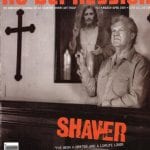Oh Susanna – Dreams to remember
Based on the mental image created by Suzie Ungerleider’s songs, it shouldn’t be hard to spot her among the lunching businessmen and well-heeled tourists in a posh Toronto hotel dining room.
Over the course of an EP and two albums, Ungerleider — who goes by the stage name Oh Susanna — has potently detailed a world filled with troubled loners, downtrodden miners, bandits and lovers whose passions have surrendered to cruelty and even violence. If that would lead you to keep an eye out for a black-swathed country-goth — say, Sylvia Plath in cowboy boots — well, you’d be wrong. There she is in a bubblegum-pink sweater, with a mile-wide grin, a firm handshake and a laugh she gives up easily, often, and at a volume that causes at least one fellow dining room patron to look up from his salad.
As she recalls the making of Sleepy Little Sailor — released in January on Square Dog Records in her native Canada and due March 27 on Catamount in the U.S. — she talks of the laughing fits that proceeded every take, the camaraderie she felt with her band, and the warm support she gets from fellow musicians.
It’s hard to equate the humor and good vibes with the heartache and darkness in the songs. The bereft subject of the title cut sees his life refracted through a series of broken relationships. Otis Redding’s “I’ve Got Dreams To Remember” is given a deep blue revival. “River Blue” touches on bruised familial bonds, while none of the intimacies in “Beauty Boy”, “Sacrifice” and “St. Patrick’s Day” appear to have happy endings.
The disconnection between her bright disposition and her haunted work is a puzzle even to her friends. “[Her songs] are just so dark, and she is such a happy person,” says Blue Rodeo bassist Bazil Donovan, who plays in Ungerleider’s touring band and co-wrote two songs on Sleepy Little Sailor. “And then she would sing these songs, and they were these beautiful stories. But the darkness in them overwhelmed me.”
Colin Cripps, who produced the new album, says the dichotomy between her character and her music is her strength. “She has an effortless quality to her work,” he observes. “She is very inspiring to play with and to hear. She is very generous with her emotions, but she is not an emotional rollercoaster. She knows what she wants in terms of how the song portrays the emotion and the message, but she is not neurotic about it.”
For her part, Ungerleider says she has no problem balancing a sunny demeanor with a somber muse. “I think that I am kind of a dark person, even though I don’t expose that to people,” she reckons. “My natural tendency is to try and be cheerful and friendly. I don’t know whether there is a reason for having a dark side. It is not like I had anything really terrible happen to me. But I have always been drawn to things that dealt with serious issues, and that can be seen as dark.
“I never thought of it as strange or dark, but you go out in the world and people tell you, ‘That is a very strange thing.’ Like, the movie Brazil. Or loving Halloween. Or loving the Sex Pistols. Or ‘Sympathy For The Devil’. I have no idea why that speaks to my soul.”
She pauses, then adds with a laugh: “I was thinking, I could be glib and say, it’s because I’m a Scorpio, man!”
Current wisdom in modern music says talent is nothing without ambition; that if you aren’t blessed with both artistic gifts and ruthless drive, you better get used to busking in the subway. But the story of how Ungerleider got started should be an inspiration to anyone who believes destiny and luck are as important as the force of will.
Though Ungerleider says she’s resigned to and even relishes the life of a working musician, it could be said that it’s a life that chose her. She is one of two daughters born to a university sociology professor father and a school librarian mother who raised her in Vancouver, British Columbia. Music always held a fascination for her, even if the discipline it takes to make music proved more elusive. As a child, she would bang away at the piano, so her parents signed her up for lessons, a tedious ordeal that she believed was neither necessary nor as fun as her cacophonous keyboard-hammering.
“That is a beautiful little kernel of how I approach music,” she says. “Technique means you have to use something that is boring. The results you yield are incredible, but I can never get through that part. It is like learning grammar to write poetry.”
More important than music lessons, though, her parents gave her a reverence for the past, and taught her to value history and early works of art. “The message was, black-and-white photography is way cooler than color,” she says.
After an adolescence spent in the thrall of punk (detailed in the Sleepy Little Sailor track “Kings Road”), she attended Montreal’s Concordia University, where she worked at a liberal arts degree. To relieve the tedium of Kant, Heidegger and Marx, she created her own country-themed show for the campus radio station. She devoured histories of rural music, digested biographies of great blues, folk and western figures, and discovered dog-eared volumes of discarded country songs, scratchy field hollers and fiddle tunes.
One of her college courses was called The Great Books Of Western Civilization, so she dubbed her radio show “The Great Works Of Country And Western Civilization”, and adopted, as her on-air moniker, Suzie Cowpie. “I think the only people who heard it were in the building where it was being broadcast from,” she recalls. “It was more of an amusing thing for me.”




